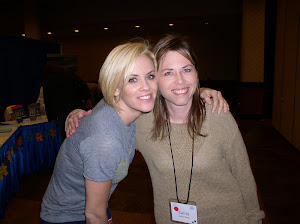Dr. Stephen Gutstein is the creator of RDI therapy, which you can read more about here:
http://www.rdiconnect.com/, and the parents who have been trained and are using it seem very enthusiastic. Jenny McCarthy is a famous mom who has used this therapy, but I am very excited to report that a therapist at the facility where my son receives therapy is being certified in RDI.
This talk focused on a specific issue that children with autism face: dynamic vs. static thinking. IQ tests measure static thinking(what you have learned), and people with ASD may have excellent S.T. because ASD doesn't affect this type of thinking. In a typically developing child, dynamic thinking actually develops first/ With D.T., there is no single pre-learned link between problem and solution. We must use our experience to evaluate and sometimes "construct" optimal plans and strategies. We must make continuing adjustments based on new information as well as feedback from our actions. It's the way we solve real-world problems, conduct ongoing relationships, and negotiate the continually changing stream of life. D.T. is not correlated with IQ scores, and it is, according to Dr. Gutstein, the universal deficit in ASDs.
So to sum up, static thinking is what you know & how you apply knowledge in static environments, whereas dynamic (or constructive)thinking volves what you do with what you know in a continually changing world; making continual "course corrections" based on evaluating adapting, ever-changing situations, because going off course is inevitable in the real world.
Currently in the works is an RDI Dynamic Thinking Remediation curriculum. It has a developmental progression of objectives, and is reverse-engineered into 1,138 (WOW!) very small, observable steps. The goal is to carefully introduce new discoveries, and then elaborating on those discoveries to generalize into many areas. A primary goal is that the children come away feeling that some uncertainty can be interesting rather than frightening. They should also become more adept at generating multiple solutions to a problem. In addition, the focus is turning previously automatic reactions into deliberate actions. So the overarching goal of this curriculum is competence: the knowledge that you can handle anything thrown at you. You desire to undertake challenging problems, master new abilities and enter new environments. Also you learn to recover successfully from difficult moments and maintain trust & motivation for future challenges.
Thursday, March 20, 2008
Subscribe to:
Post Comments (Atom)



No comments:
Post a Comment